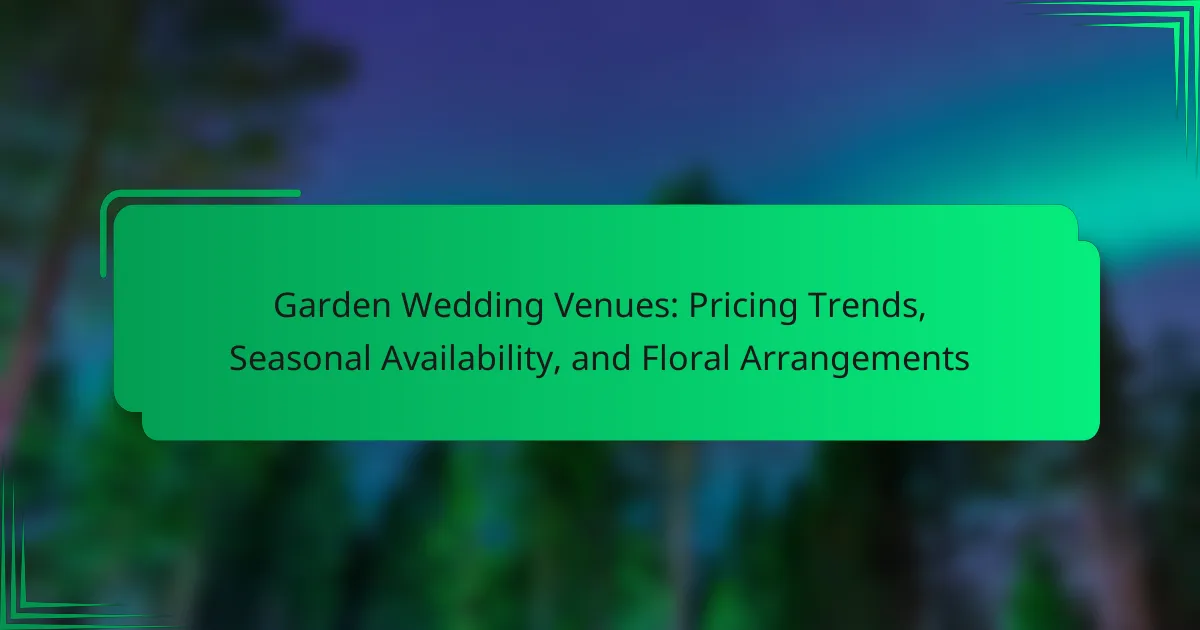Garden wedding venues are outdoor locations designed for wedding ceremonies and receptions, often featuring natural landscapes like gardens, parks, or estates. This article explores current pricing trends for these venues, noting an average cost range of $3,000 to $10,000, influenced by seasonal demand and location. It also highlights the importance of seasonal floral availability, as certain flowers bloom at specific times, impacting both aesthetics and budgets. Additionally, best practices for floral arrangements in garden settings are discussed, emphasizing the selection of seasonal blooms, color coordination, and the incorporation of greenery to enhance the overall visual appeal.
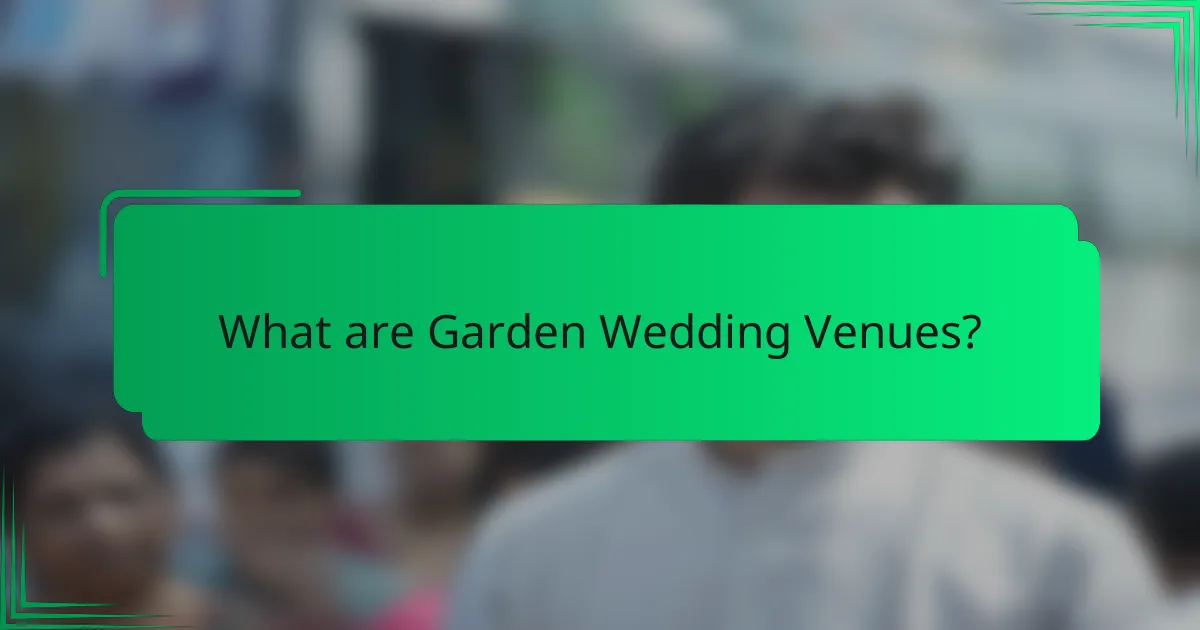
What are Garden Wedding Venues?
Garden wedding venues are outdoor locations specifically designed for hosting wedding ceremonies and receptions. These venues often feature natural landscapes, such as gardens, parks, or estates. They provide a picturesque setting with greenery, flowers, and sometimes water features. Many couples choose garden venues for their romantic ambiance and connection to nature. Garden wedding venues can vary in size and capacity, accommodating small intimate gatherings or larger celebrations. Some venues offer additional services, such as catering and event planning. The appeal of garden venues often lies in their scenic backdrops for photography. Popular garden wedding venues can be found in various regions, often reflecting local flora and climate.
How do Garden Wedding Venues differ from other wedding venues?
Garden wedding venues differ from other wedding venues primarily due to their natural outdoor settings. They offer lush greenery, vibrant flowers, and scenic backdrops that enhance the aesthetic appeal. Unlike traditional indoor venues, garden venues provide a unique ambiance influenced by the seasons. This allows for diverse floral arrangements that can change throughout the year. Many garden venues also have specific seasonal availability due to weather conditions. This can affect pricing trends, as peak seasons may command higher rates. Additionally, garden venues often require specific permits for outdoor events, which is less common with indoor venues. Overall, the distinct environment and seasonal factors set garden venues apart from other wedding options.
What unique features do Garden Wedding Venues offer?
Garden wedding venues offer unique features such as natural landscapes and scenic backdrops. These venues often include lush greenery, vibrant flowers, and picturesque views. Many garden venues provide outdoor ceremony spaces that enhance the romantic atmosphere. They often have customizable areas for receptions, allowing for personalized decor. Some venues include water features like ponds or fountains, adding tranquility to the setting. Additionally, garden wedding venues may offer exclusive access to the property, ensuring privacy for the couple and guests. These features contribute to a memorable and enchanting wedding experience.
Why are Garden Wedding Venues popular among couples?
Garden wedding venues are popular among couples due to their natural beauty and romantic settings. These venues often provide stunning backdrops with lush greenery and vibrant flowers. Many couples seek outdoor spaces for a more relaxed atmosphere. Garden venues typically allow for creative decor options that enhance the natural surroundings. The picturesque environment often leads to memorable photographs. Additionally, these venues can accommodate various guest sizes, making them versatile. The serene ambiance of gardens contributes to a more intimate celebration. Many couples appreciate the seasonal blooms that add color and charm to their wedding day.
What factors influence the pricing of Garden Wedding Venues?
The pricing of garden wedding venues is influenced by several key factors. Location plays a significant role; venues in popular or scenic areas often charge higher rates. The size and capacity of the venue also affect pricing, as larger spaces typically incur higher costs. Seasonal availability is another crucial factor; peak wedding seasons can lead to increased prices due to high demand.
Amenities provided by the venue, such as catering, decoration, and parking, can further impact costs. The exclusivity of the venue, including whether it is a private estate or a public garden, also influences pricing. Additionally, the reputation and experience of the venue management can affect rates, as well-established venues may charge a premium.
Finally, the duration of the rental period can impact pricing; longer events generally incur higher fees. All these factors collectively determine the overall pricing structure of garden wedding venues.
How do location and accessibility affect venue pricing?
Location and accessibility significantly influence venue pricing. Venues situated in prime locations often charge higher rates due to demand. For example, venues in urban centers typically have elevated prices compared to those in rural areas. Accessibility also plays a crucial role; venues that are easily reachable by public transport or major highways tend to attract more clients. This increased foot traffic can justify higher pricing. According to a study by Eventbrite, venues with convenient access can charge up to 30% more than less accessible options. Additionally, venues that require extensive travel can incur additional costs for transportation and logistics, impacting overall pricing.
What role do amenities play in the cost of Garden Wedding Venues?
Amenities significantly influence the cost of garden wedding venues. The presence of amenities such as catering services, restrooms, and parking can increase venue pricing. High-quality amenities often lead to higher rental fees. Venues with extensive landscaping or built-in decor may charge more for their aesthetic appeal. Additionally, venues offering unique features, like gazebos or outdoor lighting, typically have higher costs. According to a survey by WeddingWire, venues with comprehensive amenities can cost up to 30% more than those without. This indicates that amenities are a crucial factor in determining the overall price of garden wedding venues.
What are the seasonal availability trends for Garden Wedding Venues?
Garden wedding venues typically experience peak availability during spring and early summer. This is when many couples prefer to have outdoor weddings due to favorable weather conditions. Venues often have limited availability in late spring and summer months due to high demand.
In contrast, fall offers a second peak season, especially in regions with vibrant foliage. Winter months generally see lower demand, leading to more availability. Specific venue availability can fluctuate based on geographic location and local climate conditions.
Research indicates that couples often book venues 12-18 months in advance, especially for popular dates. This advance booking can create competition for prime dates in peak seasons. Therefore, couples should consider off-peak times for potentially better availability and pricing.
How does the season impact the choice of a Garden Wedding Venue?
The season significantly impacts the choice of a garden wedding venue. Each season offers unique aesthetics and weather conditions. Spring provides blooming flowers and mild temperatures, ideal for outdoor ceremonies. Summer offers vibrant greenery but may bring heat and humidity, requiring shaded areas. Autumn features colorful foliage, creating a picturesque backdrop but can introduce unpredictable weather. Winter, while less common, can offer a serene, frosty landscape, although outdoor options may be limited. Couples often select venues based on seasonal beauty and comfort, influencing their overall wedding theme and guest experience.
What months are most popular for Garden Weddings?
The most popular months for garden weddings are typically May through October. These months offer favorable weather conditions for outdoor ceremonies. In many regions, spring and early summer months like May and June are particularly sought after for blooming flowers. August and September also remain popular due to mild temperatures. According to wedding industry surveys, 30% of couples choose to marry during this peak season. This trend is consistent across various geographical locations, highlighting the appeal of garden settings during these months.
How can couples choose the right floral arrangements for Garden Weddings?
Couples can choose the right floral arrangements for garden weddings by considering the venue’s aesthetic and seasonal flowers. The floral design should complement the natural surroundings of the garden. Couples should also think about their wedding theme and color palette, as this will guide their flower selection. Consulting with a florist experienced in garden weddings is beneficial. They can provide insights on flower availability and seasonal blooms. Additionally, couples should consider the size of the arrangements to ensure they fit well in the outdoor space. Budget constraints are another important factor; couples should discuss pricing options with their florist. Ultimately, personal preferences and the overall vibe of the wedding should drive the final choices.
What types of flowers are best suited for outdoor weddings?
Roses, peonies, and hydrangeas are among the best flowers for outdoor weddings. Roses are classic and come in various colors, making them versatile for any theme. Peonies are known for their lush blooms and sweet fragrance, adding elegance to arrangements. Hydrangeas provide a full, voluminous look and are available in numerous shades. Additionally, sunflowers and daisies bring a cheerful, rustic feel to outdoor settings. Seasonal availability enhances their appeal, as many of these flowers bloom in spring and summer. For instance, peonies are typically in season from late spring to early summer, ensuring freshness for weddings during that time.
How do seasonal flowers affect floral arrangements in Garden Weddings?
Seasonal flowers significantly influence floral arrangements in garden weddings. Their availability dictates which blooms can be used in designs. Seasonal flowers offer vibrant colors and fresh scents that enhance the wedding atmosphere. They are often more affordable due to local availability, reducing overall costs. Additionally, using seasonal blooms ensures optimal freshness and longevity in arrangements. Research shows that seasonal flowers can increase the aesthetic appeal of wedding decor. They align with the natural setting of garden venues, creating a cohesive look. Overall, seasonal flowers play a crucial role in the design and cost-effectiveness of floral arrangements in garden weddings.
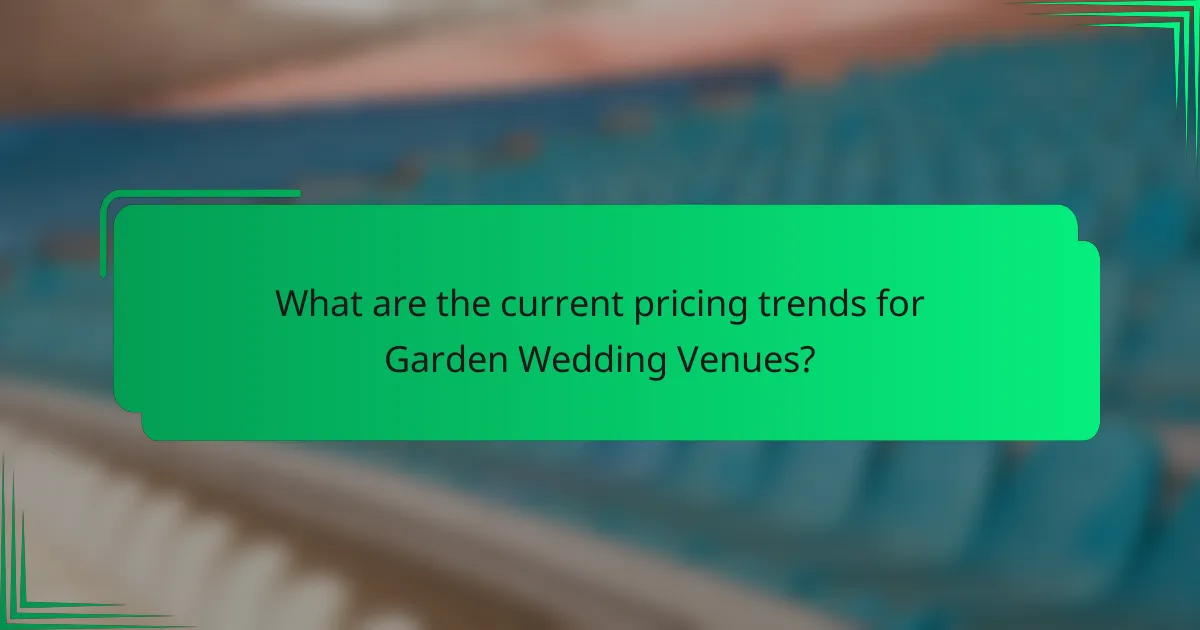
What are the current pricing trends for Garden Wedding Venues?
Current pricing trends for garden wedding venues indicate a gradual increase in costs. Recent data shows average venue prices range from $3,000 to $10,000. Seasonal demand significantly influences pricing. Venues tend to charge more during peak wedding months, such as June and September. Additionally, location impacts costs; urban gardens often have higher fees compared to rural settings. Some venues offer package deals that include catering and decorations, potentially lowering overall expenses. A survey by WeddingWire in 2023 reported a 15% increase in venue prices compared to the previous year. This trend reflects the rising popularity of outdoor weddings and the associated demand for picturesque locations.
How have prices changed over the past few years for Garden Wedding Venues?
Prices for garden wedding venues have generally increased over the past few years. According to a report by The Knot, the average cost of a garden wedding venue rose by approximately 10% from 2020 to 2023. This increase is attributed to higher demand for outdoor spaces, especially post-pandemic. Furthermore, the COVID-19 pandemic shifted preferences towards outdoor events, driving up prices. In 2021, the average cost was around $5,000, while it reached about $5,500 in 2023. Additionally, inflation and rising operational costs have contributed to this trend. Overall, couples should expect to pay more for garden wedding venues compared to previous years.
What factors contribute to rising or falling venue costs?
Venue costs fluctuate based on several key factors. Location plays a crucial role; venues in urban areas typically charge more than those in rural settings. Seasonal demand also impacts pricing; peak wedding seasons see higher costs due to increased demand. Venue size affects costs as larger spaces accommodate more guests, leading to higher rental fees. Amenities offered by the venue, such as catering and decoration, can raise overall expenses. Economic conditions influence pricing; during economic downturns, venues may lower costs to attract clients. Competition among venues can lead to price adjustments, with some lowering fees to remain attractive. Lastly, changes in regulations or taxes can directly affect venue costs.
What are the average costs associated with Garden Wedding Venues?
The average costs associated with garden wedding venues range from $2,000 to $10,000. This price variation depends on factors such as location, venue size, and included amenities. For example, venues in urban areas typically charge higher fees than those in rural settings. Additionally, peak wedding seasons can lead to increased costs. Many garden venues offer packages that may include catering, decorations, and rental equipment. On average, couples can expect to pay around $5,000 for a mid-range garden venue. This pricing reflects the growing popularity of outdoor weddings, as reported by industry surveys.
How do average costs vary by location and season?
Average costs for garden wedding venues vary significantly by location and season. In urban areas, prices tend to be higher due to demand and limited availability. For example, venues in cities like New York or Los Angeles can range from $5,000 to $20,000. In contrast, rural venues may cost between $2,000 and $10,000. Seasonal variations also impact pricing. Peak wedding season, typically from late spring to early fall, sees higher rates. During this time, venues may charge 20% to 50% more than in the off-peak season, which includes winter months. Additionally, specific holidays or weekends can further inflate costs. For instance, a wedding on a holiday weekend can increase venue fees by an additional 30%.
What additional fees should couples be aware of when budgeting?
Couples should be aware of several additional fees when budgeting for a garden wedding. These fees can include venue rental fees, which may vary based on the season and day of the week. Couples should also consider costs for permits, especially if the venue requires them for events. Additionally, there may be fees for setup and breakdown services, which can add to the overall expense. Catering costs can also include service charges and gratuities, which are often overlooked. Couples should account for decor and floral arrangement costs that may not be included in the venue package. Lastly, parking fees for guests can be an unexpected expense that should be factored into the budget.
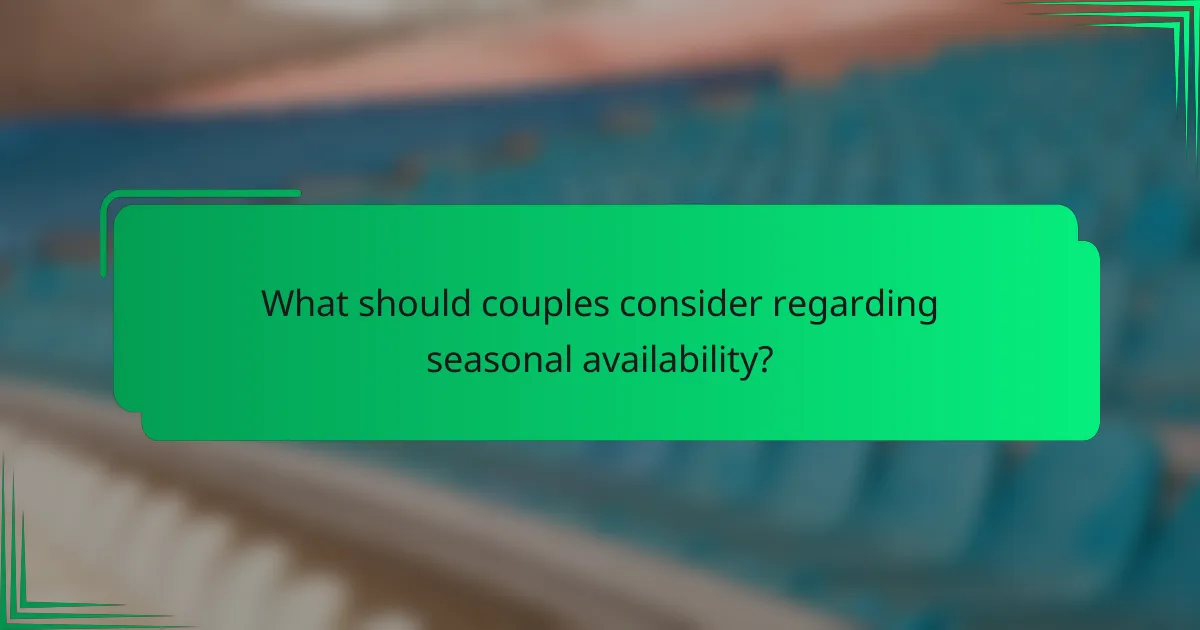
What should couples consider regarding seasonal availability?
Couples should consider the specific flowers and plants that are in bloom during their chosen wedding season. Seasonal availability affects the selection of floral arrangements significantly. Certain flowers are only available during specific months. For example, peonies are typically in bloom from late spring to early summer. This can impact both the aesthetic and budget of the wedding. Additionally, seasonal weather conditions can influence venue accessibility and comfort. Couples must also consider the overall theme and color palette that align with the season. Understanding these factors helps in making informed decisions for a successful garden wedding.
How does weather influence the choice of date for a Garden Wedding?
Weather significantly influences the choice of date for a garden wedding. Couples often prefer dates with mild temperatures and low precipitation. Ideal weather enhances guest comfort and ensures a pleasant outdoor experience. Rain can disrupt plans, leading to last-minute venue changes or indoor setups. High humidity or extreme heat may also deter guests from attending. Seasonal trends show that spring and early fall are popular for garden weddings due to favorable climates. According to the American Meteorological Society, average temperatures in these seasons typically range from 60°F to 75°F. This data supports the preference for these months among couples planning garden weddings.
What preparations can be made for unexpected weather changes?
To prepare for unexpected weather changes during a garden wedding, couples should have a contingency plan. This plan may include renting a tent to provide shelter. Tents can protect guests and decorations from rain or excessive sun. Additionally, having extra umbrellas on hand can be beneficial for guests. Weather-appropriate attire for the wedding party is also advisable.
Monitoring weather forecasts leading up to the event is crucial. This allows for timely adjustments to plans if severe weather is predicted. Providing guests with information about weather conditions can help them prepare accordingly. Lastly, consider choosing a venue with indoor options available in case of inclement weather. These steps can ensure a smooth experience despite unexpected weather changes.
What are the benefits of off-peak seasons for Garden Weddings?
Off-peak seasons for garden weddings offer several benefits. First, venues often provide lower rental rates during these times. This can result in significant cost savings for couples. Additionally, there is typically greater availability of preferred dates. Couples can secure their desired venue without competing with other events.
Off-peak seasons also allow for more personalized service. Vendors may have more time to dedicate to each couple. This can lead to a more tailored wedding experience. Furthermore, gardens may showcase unique seasonal blooms that are less common in peak months.
Weather conditions can also be more favorable in certain off-peak times. This can enhance the overall outdoor experience for guests. Overall, choosing an off-peak season can lead to a more budget-friendly and customized wedding.
How can couples take advantage of lower pricing during off-peak seasons?
Couples can take advantage of lower pricing during off-peak seasons by booking their garden wedding venues during these times. Off-peak seasons typically see reduced demand, leading to significant discounts from venues. For example, many venues offer up to 30% lower rates during winter months compared to peak summer dates. Additionally, couples can negotiate better package deals and receive complimentary services during off-peak times. This can include free floral arrangements or upgraded catering options. By planning their wedding in the off-peak season, couples can maximize their budget and enhance their overall experience.
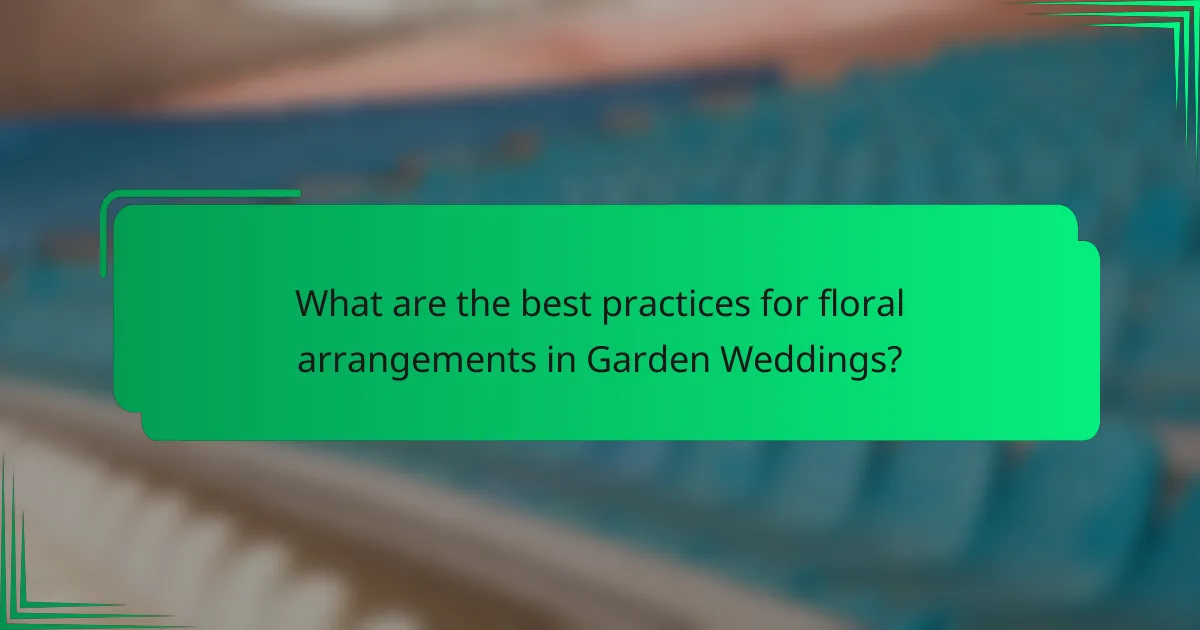
What are the best practices for floral arrangements in Garden Weddings?
The best practices for floral arrangements in garden weddings include selecting seasonal flowers. Seasonal blooms are fresher and more cost-effective. Consider the color palette of the wedding. Harmonious colors enhance the overall aesthetic. Use various heights and textures in arrangements. This adds depth and interest to the displays. Incorporate greenery to complement flowers. Foliage provides a natural look and fills spaces. Ensure arrangements are stable and secure. This prevents them from tipping over in outdoor settings. Lastly, coordinate with the venue’s natural elements. This creates a cohesive and beautiful setting.
How can couples incorporate the natural surroundings into their floral designs?
Couples can incorporate natural surroundings into their floral designs by using locally sourced flowers and greenery. This approach enhances the connection between the floral arrangements and the environment. Utilizing seasonal blooms ensures that the flowers complement the existing landscape. Couples can also incorporate elements like branches, stones, or moss to reflect the venue’s natural aesthetic. Arranging flowers in natural shapes and forms mimics the organic lines found in nature. Additionally, choosing colors that resonate with the surroundings can create a harmonious look. For instance, earthy tones work well in garden settings. This method not only beautifies the space but also supports local ecosystems by promoting native flora.
What tips can help achieve a cohesive look with floral arrangements?
To achieve a cohesive look with floral arrangements, select a unified color palette. This palette should consist of complementary colors that enhance each other. Choose flowers with varying textures to add depth while maintaining harmony. Incorporate greenery to create balance and fill gaps. Use similar vase styles across arrangements to maintain consistency. Consider the scale of flowers and containers to ensure proportionate designs. Arrange flowers in odd numbers for a natural appearance. Finally, keep the overall theme of the wedding in mind to ensure alignment with the decor.
What common mistakes should be avoided when selecting floral arrangements?
Common mistakes to avoid when selecting floral arrangements include not considering the wedding theme. The floral design should complement the overall aesthetic of the event. Ignoring seasonal flowers is another mistake. Seasonal flowers are often fresher and more cost-effective. Overlooking the size and scale of arrangements can lead to an imbalance in decor. It’s important to match the arrangement size to the venue’s dimensions. Additionally, failing to communicate budget constraints can result in unexpected costs. Clear communication with the florist ensures alignment on expectations. Lastly, neglecting to account for flower allergies among guests can lead to discomfort. Always consider the preferences of the attendees when making selections.
How can couples ensure their floral choices complement the venue?
Couples can ensure their floral choices complement the venue by considering the venue’s color palette and style. Matching floral colors to the venue’s existing hues creates visual harmony. For example, if the venue features soft pastels, selecting similar floral tones enhances the overall aesthetic. Additionally, couples should evaluate the venue’s architectural features. Bold floral arrangements can stand out in rustic venues, while delicate blooms suit elegant settings. Research shows that cohesive design elements improve guest experience and satisfaction. Finally, consulting with a florist experienced in venue-specific arrangements can provide tailored recommendations.
Garden wedding venues are outdoor locations designed for hosting wedding ceremonies and receptions, characterized by natural landscapes and scenic backdrops. This article covers key aspects of garden wedding venues, including pricing trends influenced by location, size, and amenities, as well as seasonal availability and the impact of weather on wedding planning. Additionally, it discusses best practices for selecting floral arrangements that complement the venue’s natural beauty, highlighting the importance of seasonal flowers and cohesive design. Couples will gain insights on how to navigate the unique features and considerations of garden wedding venues to create a memorable experience.
